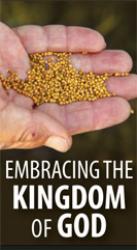
This weekend we celebrate Easter and the holy days that lead up to it. We proclaim that Jesus rose from the dead, and we hope in the resurrection that we will share with him.
The resurrection two centuries ago from a rock-enclosed tomb is good news not just for the followers of Jesus in the past but for all who wish to find meaning in a world that is sometimes hard and full of dying. Easter reminds us that at the core of our faith is the confidence that death is never the final word from God. The final word is always life.
In the Gospel of John, Jesus compares himself to the sheepfold and gate where the flock enters for safety, and to the shepherd himself who in his goodness will die for the flock (John 10). While John’s Gospel does not use explicit language for the kingdom of God, by preserving the image of the shepherd who comes to give abundant life, we are drawn into a picture of God’s kingdom that focuses our vision on abundance, specifically on abundant life.
In our day and time, there are plenty of voices that promote a false type of abundance. Proponents and preachers of this type of message have equated abundant life with a prosperous life, so much so that their message has been dubbed “the prosperity gospel.” Their message is presented as a kind of formula assuring followers of Christ that if their faith is strong enough, and their donations steady enough, they will reap the rewards in financial security. This is surely not what Jesus has in mind when he says, “I came so that they might have life and have it more abundantly.”
The meaning of this abundant life is illustrated in myriad ways throughout Scripture and especially in Jesus’ descriptions of the kingdom of God. From the lush garden of Eden in the second chapter of Genesis, to the tasty feast described in the 25th chapter of the prophet Isaiah, to the life-giving water and the tree of life in the final chapter of Revelation, we are constantly reminded that God is not miserly, and by extension, God’s kingdom is marked by a sense of plenty.
Jesus’ teachings, his healing touch, and even his critique of his own religious institutions are all meant to redirect human desire to the fullness of life that God wants for us. Jesus illustrates what he knows to be true: God is generous, and in that generosity, we find more than enough to give meaning to our lived experiences.
God’s abundance comes in the midst of meager resources to crowds gathered along the hillside near the Sea of Galilee. It was such an important lesson on God’s abundance and generosity that the Gospel writers included the story multiple times (Matthew 14:13-21; 15:32-38; Mark 6:31-44; Luke 9:12-17; John 1-13). Surely the crowds who gathered on the hillside near the Sea of Galilee were fed spiritually before they ever tasted the loaves and fish. Both were satisfying.
Another lesson in abundance comes in the form of the familiar parable of the sower and the seed. Whether the seed is meant to represent God’s word (as in Mark 4:1-9, 13-20) or the disciples who receive God’s teaching (as in Matthew 13:1-9, 18-23), it is striking that the sower just tosses all the precious seeds from his hands and lets them land where they may. The sower, representing God, exhibits a generosity that is certainly not logical but is lavish to the extreme. God’s kingdom, once again, is marked by such lavish and hopeful gestures.
The ministry of Jesus, marked by abundant generosity and mercy, informs our minds and hearts and still has the power to animate our actions. Receiving from God’s abundance transforms us, and through us, could reform the world.
Catherine Upchurch is the general editor of the Little Rock Catholic Study Bible and contributes to several biblical publications. She writes from Fort Smith.
Please read our Comments Policy before posting.
Article comments powered by Disqus Vatican issues Mass readings to pray for self-restraint
Vatican issues Mass readings to pray for self-restraint
 Justice is a gift and a challenge
Justice is a gift and a challenge
 Jesus interested in how we love family and vulnerable
Jesus interested in how we love family and vulnerable
 Take on the same attitude as Christ Jesus
Take on the same attitude as Christ Jesus
 Good stewards know why we give treasure
Good stewards know why we give treasure
 Winning directory photo honors Our Lady of Guadalupe
Winning directory photo honors Our Lady of Guadalupe
 St. Paul says: How does the Bible define love?
St. Paul says: How does the Bible define love?
 6 steps to getting married in Diocese of Little Rock
6 steps to getting married in Diocese of Little Rock
 Most frequently asked questions on Catholic marriage
Most frequently asked questions on Catholic marriage
 St. Joseph a model of solidarity with immigrants
St. Joseph a model of solidarity with immigrants
 Two gifts after Jesus’ death: Virgin Mary and Eucharist
Two gifts after Jesus’ death: Virgin Mary and Eucharist
 Why we have an altar, and not just a communion table
Why we have an altar, and not just a communion table
 Pope: Wars should be resolved through nonviolence
Pope: Wars should be resolved through nonviolence
 Living relationship with Jesus Christ in the Eucharist
Living relationship with Jesus Christ in the Eucharist